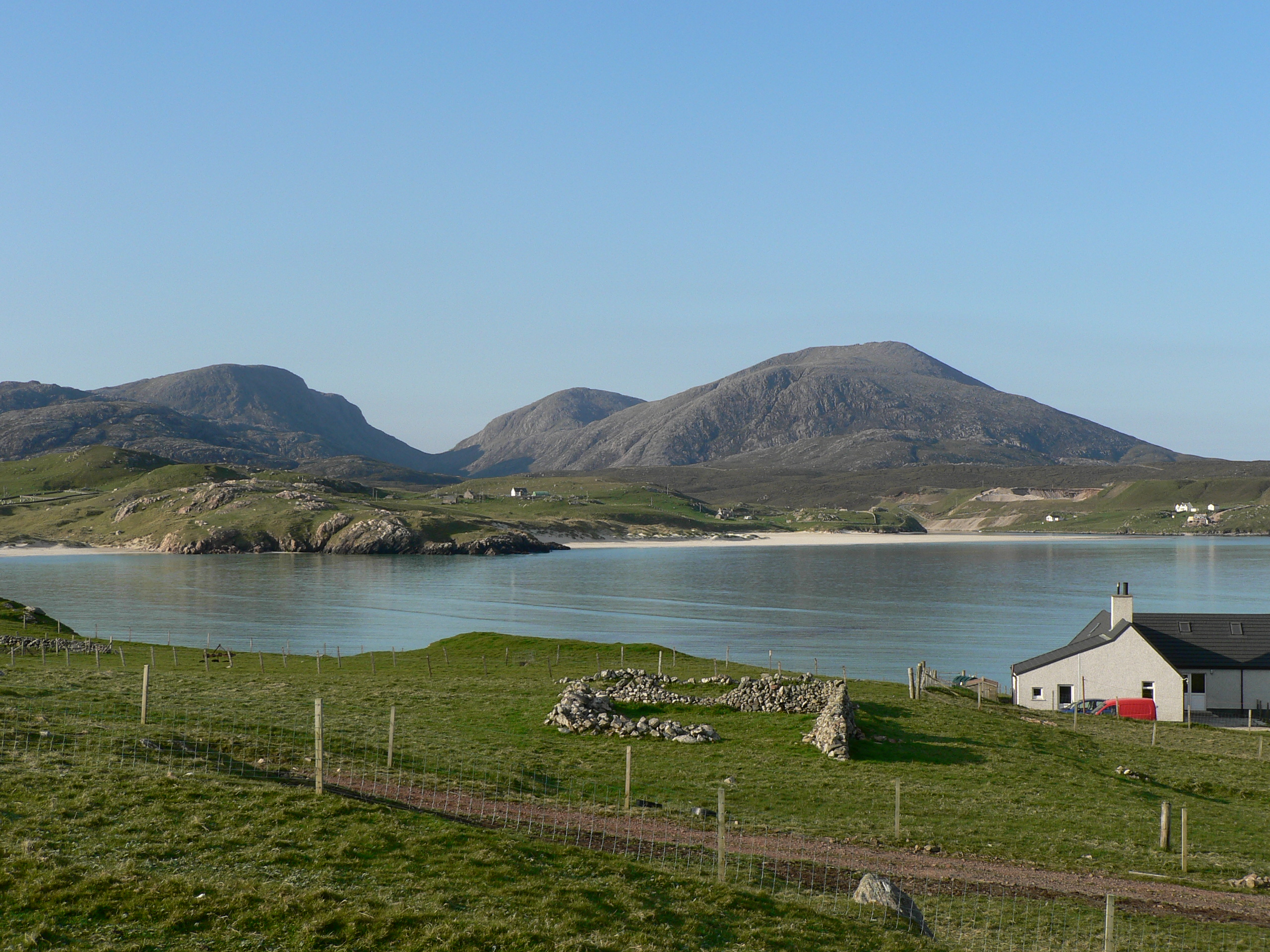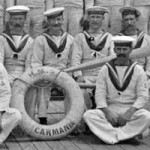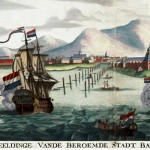Category: Military & Police
Before the Dingwall Sheriff
Donald Macdonald, DSM
Leabhar na Beatha
A Little Extra Hardship in Groningen
An Airman at Aird Uig, 1959-61
A Memorable Sunday in Lewis
The Soldiers’ Return
RAF Party Stuck at Achmore
Five Sons at Sea
Just now I am up in a cold land…
Just now I am up in a cold land
And a message has arrived for us to go to sea,
That the ships are now assembled and when night comes
We have to move off with them.-Murdanie Macritchie
This song was written by Petty Officer Murdanie Macritchie, Brenish, whilst serving during the Second War on HMS Cape Palliser escorting merchant ships on a Russian convoy, PQ-15, from Iceland to Murmansk. PQ-15 (not PQ-16, as previously thought) sailed from Iceland on 26 April 1942, reaching Kola Inlet on 5 May, after several air and U-boat attacks. In the convoy were 25 merchant ships that had arrived from various seaports in the UK, plus naval escort ships. An account from English sailor Geoff Hall aboard the Commodore ship, SS Ocean Voice on convoy PQ-16, later in May, gives detail of the run from the Clyde to Loch Ewe to Iceland and then Murmansk, and of being bombed.
To be as far away as possible from the enemy’s airfields in Norway, convoys from Iceland to Russia were routed close to the ice-edge, passing Jan Mayen Island, Bear Island and Novaya Zemlya then heading for the Kola Inlet and the port of Murmansk. Arctic convoys came under attack from aircraft, U-boats, large surface ships and light surface ships.
For the return journey, HMS Cape Palliser joined convoy QP-12 as an escort, arriving back in Iceland on 29 May. En route, one day near Bear Island, convoy PQ-16 and homeward bound convoy QP-12 were incessantly attacked by 108 waves of German aircraft. Seven vessels were lost including SS Lowther Castle, SS Empire Purcell and SS Empire Lawrence. SS Empire Purcell, on her maiden voyage, was loaded with ammunition and blew up when hit by two bombs. The Ocean Voice was also badly damaged.
Murdanie Macritchie survived the war and was ordained a minister in the Church of Scotland. A translation follows the Gaelic song.
An till mi gu bràth gu Eilean mo Ghràidh
‘S don a’ bhaile a rinn mi fhàgail
Faic mi tuilleadh le mo shùilean beanntan sgire Uig
No Mealisbhal ag èirigh an àrda?An cuir mi gu bràth mo ghuaillean ri bàt
Ga cur sios gu sàl air Mol Innis?
An cuir me tuilleadh na clèibh aig a’ Sgeir Lèith
Faic mise tuilleadh Mol Bhrèinis?An dìrich mi tuilleadh an àrd dhan a’ bheinn
A thrusadh na caoraich a-nuas?
Am faic mi iad tuilleadh cruinn anns an fhaing
An cluinn mi tuilleadh mèilich nan uan?Am faic me tuilleadh na mnathan a’ deaschadh biadh
‘S ghrian os mo chionn a’ deàrrsadh?
Faic me tuilleadh chlann nighean a chleachd a bhith ann
An cluinn mise tuilleadh an gàire?
An Iolaire Survivor
no images were found
Translated from an interview with An Geal, John Maclennan, born 1896 at 15 Kneep and married at 4 Aird, Uig. The Admiralty ship the Iolaire taking servicemen home to Lewis grounded on the Beasts of Holm outside Stornoway, on the 1st of January 1919. More than two hundred men perished. Translated by Maggie Smith.
At the end of December 1918, on leave and travelling back to Lewis with other servicemen from Uig, we planned to arrive home on New Year’s day and surprise the families. Approaching Stornoway Harbour on the Iolaire the mistake was made when we changed course. All it required was less than half a point, it just needed to be slightly to the West. The lighthouse was visible, but the man at the wheel didn’t alter the course when he should have.
We never suspected a thing until she hit, it was so quiet and everything was so normal… Only two people escaped from that part of the ship I was in. One brave man swam ashore with a rope and secured it. When the ship grounded she swung round broadside. I remember moving the rope from the stern to the side, but today I don’t quite know how I managed it. A lot of those around me had lost their mind, particularly the younger men. There were no orders from the officers maybe if… If only the ship had grounded closer to the shore, most of those aboard would have been saved. But the rocks we hit were the furthest point from the shore. Although there had been a strong wind it was behind us. I was able to crawl to safety across that rope. The ship sunk eventually and one man was left clinging to the mast until he was rescued. Only seventy five people made it to the shore.
When I got ashore I was shoeless as I had been resting and had taken them off. A lot of the men had taken their shoes off and were lying down, wherever they could get space to rest their head. Reaching the shore I fell into a bog and lost my socks, then I headed for the nearest house, where a huddle of injured people had gathered. I was injured with cuts on my chest, but I never let on to anyone. It was a frosty night and I walked from Holm to Stornoway.
Seeing a sign for the Post Office I headed in that direction. I heard a woman crying. It was Maga (nighean Seonaid Chalum Tharmoid). Maga had met two Uig men who had been on the boat, Uilleam Dubh (William Maclennan 36 Cliff) and (Tuireag) Malcolm Macritchie 7 Aird. They had mentioned I was on the ship, and as they hadn’t seen me since coming ashore, they had come to the conclusion that I too, had been lost.
Calum Olach in Java
An Incident at Erista
The Seaforth Regimental Toast
William Dearg’s Medals
Seaforth Goes After his Deserters
The Death of Hector Maclean
John Munro and the Saighdeirean Mac a’ Mhinisteir
A series of articles on the Old Soldiers of Uig appeared in the Comann Eachdraidh Uig publication, Sanais, in the 1980s, from which this is an extract.
John Munro, Iain Mac a’ Mhinisteir, was the only son of the Rev Hugh Munro, minister at Bailenacille for fifty years; a son of the manse with a taste for adventure, he obtained a commission in the new battalion of the 78th (Seaforth Highlanders) raised from the Seaforth estates in 1804. He was an ensign and his commission depended on his bringing a recognised quota of twenty men with him and from the stories extant, it is still very evident that these recruits went willingly and with confidence in his leadership. His family had an excellent relationship with the people of the parish: Hugh Munro is still remembered for liberality to the poor and his son was to prove a good and caring officer to his men. He had a strong bond of shared experience with them, he spoke their language and could intercede on their behalf and on one occasion he saved one of their number, Murdo Buchanan of Carnish, from execution. Murdo was caught at inspection with his bayonet unpolished. John Munro put forth a strong defence on his behalf, pleading his valour in the previous battle, and saved him from death. He was also their only link with home’ he gave the battalion’s news in his letters to his father and this was passed on to the Bailenacille congregation from the pulpit.
He was promoted Lieutenant just a year after joining the regiment. By this time the initial training at Fort George was over and the battalion was at Hythe, where they were trained in a new system of drill invented by General Sir John Moore of Corunna fame, who inspected them before they were posted for foreign service and expressed himself as highly pleased with their appearance.
They spent the best part of a year at Gibraltar and in May 1806 they were part of the expedition to Sicily and Calabria, commanded by Sir John Stuart. The Battle of Maida was fought in hot, sultry July weather and the British army were ordered to drop their equipment to fight unhampered. It was a hand to hand fight with crossed bayonets with very little gunfire on either side. French losses were colossal, the British buried 700 enemy dead on the battlefield, but themselves lost 44, seven of which were from the 78th.
Among those were Donald Mackenzie, Dòmhnall Alain Ruaidh, a married man with a family of four daughters whose home was on the island of Pabbay. He was a native of Lochs but of mainland stock, a relation of Cailean Dearg, who was one of Seaforth’s officials. His demise in foreign fields left his widow Anne Macleod on Pabbay in dire straits, lacking menfolk to man the boat. Her army pension allowed her to acquire a holding in the old village of Gisla [her uncle Murdo Macleod, Murchadh mac Iain mhic Thorcuil, was tacksman there] and their descendents in Uig, Bernera and Canada are numerous. Another soldier in John Munro’s battalion, Malcolm Macarthur from Bernera, was wounded but there seems to be no further mention of his service. Malcolm Smith, Calum Gobha of Enaclete, and Murdo Macleod, Murchadh Chaluim Rhuaidh, later of Crowlista and a renowned bard, were also both at Maida.



